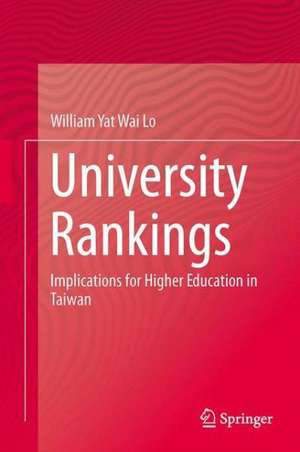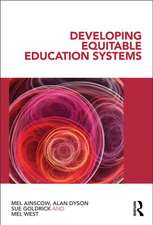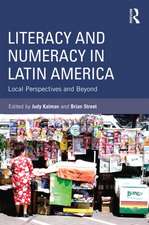University Rankings: Implications for Higher Education in Taiwan
Autor William Yat Wai Loen Limba Engleză Hardback – 5 mar 2014
| Toate formatele și edițiile | Preț | Express |
|---|---|---|
| Paperback (1) | 635.80 lei 6-8 săpt. | |
| Springer Nature Singapore – 3 sep 2016 | 635.80 lei 6-8 săpt. | |
| Hardback (1) | 642.03 lei 6-8 săpt. | |
| Springer Nature Singapore – 5 mar 2014 | 642.03 lei 6-8 săpt. |
Preț: 642.03 lei
Preț vechi: 755.33 lei
-15% Nou
Puncte Express: 963
Preț estimativ în valută:
122.89€ • 133.53$ • 103.30£
122.89€ • 133.53$ • 103.30£
Carte tipărită la comandă
Livrare economică 21 aprilie-05 mai
Preluare comenzi: 021 569.72.76
Specificații
ISBN-13: 9789814560344
ISBN-10: 9814560340
Pagini: 150
Ilustrații: XXI, 179 p. 8 illus.
Dimensiuni: 155 x 235 x 20 mm
Greutate: 0.46 kg
Ediția:2014
Editura: Springer Nature Singapore
Colecția Springer
Locul publicării:Singapore, Singapore
ISBN-10: 9814560340
Pagini: 150
Ilustrații: XXI, 179 p. 8 illus.
Dimensiuni: 155 x 235 x 20 mm
Greutate: 0.46 kg
Ediția:2014
Editura: Springer Nature Singapore
Colecția Springer
Locul publicării:Singapore, Singapore
Public țintă
ResearchCuprins
Chapter 1 Introduction.- Chapter 2 Taiwan’s Higher Education System in Context.- Chapter 3 Theorising University Rankings.- Chapter 4 Dimension 1: Influences of University Rankings - Changes in Policy, University Governance and Individual Behaviours.- Chapter 5 Dimension 2: Manifestations of the Normative Power of University Rankings - Struggling between Love and Hate.- Chapter 6 Dimension 3: University Rankings and the Global Landscape of Higher Education - Using University Rankings to Promote Local Interests.- Chapter 7 Dimension 4: Antinomy of the Power of University Rankings - World-class Worldwide versus Global Hegemony.- Chapter 8 Conclusion.
Notă biografică
William Yat Wai Lo is Assistant Professor in the Department of International Education and Lifelong Learning, The Hong Kong Institute of Education. He received his PhD from University of Bristol, and has worked as a researcher in Hong Kong and Britain. His main research interests include education policies and reforms in East Asia, and the impacts of globalization on education. His current research focuses on the implications of global university rankings for higher education. His publications have appeared in Higher Education Policy (Palgrave Macmillan), Globalisation, Societies and Education (Routledge), Comparative Education (Routledge), Compare (Routledge), Higher Education (Springer) and Asia Pacific Journal of Education (Routledge). He also serves as the General Secretary of the Hong Kong Educational Research Association.
Textul de pe ultima copertă
This book adopts a qualitative case study approach to provide the readers with a systematic delineation and interpretation of the implications of the university ranking phenomenon for Taiwan’s higher education system. It reviews the literature on different theories concerning the global transformation of higher education and presents basic information on higher education in Taiwan. The author develops a four-dimensional framework for the analysis of the ranking phenomenon in the island-state. First, the technological/ecological dimension aims to look into how the rankings have impacted Taiwan’s higher education based on empirical findings from five Taiwanese public universities. Next, the technological/geographical dimension examines how Taiwan can use rankings to promote its interests in global higher education. The two conceptual dimensions focus on the relationship between the rankings and power in higher education. They show how the phenomenon can be read and explained through theoretical lenses from ecological and geographical perspectives. From an ecological perspective, the empirical evidence suggests that the influence of rankings varies throughout the academic hierarchy in Taiwan. The theoretical analysis then illustrates the relationship between the ranking phenomenon and the power structure in academic hierarchy. Geographically, while the empirical analysis is based on data from Taiwan, the theoretical analysis offers essential insights that help readers to understand the changing global landscape of higher education and its implications in East Asia.
Caracteristici
First book on the implications of university rankings for higher education in Taiwan Provides a systemic delineation and interpretation of the ranking phenomenon Analyses the ranking phenomenon at both local and global levels, including its impacts on academic life and global competition in higher education Presents a ground-breaking analysis of the relationship between regionalisation of higher education and university rankings Includes supplementary material: sn.pub/extras

















